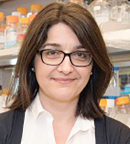
Christine Mayr, MD, PhD
Molecular biologist Christine Mayr, MD, PhD, of Memorial Sloan Kettering’s Sloan Kettering Institute is among this year’s 12 recipients of the prestigious National Institutes of Health (NIH) Director’s Pioneer Award. Established in 2004, the annual award recognizes and supports individual scientists of exceptional creativity who propose pioneering and highly innovative approaches with the potential to produce an unusually high impact on biomedical or behavioral research.
Groundbreaking Work
Dr. Mayr was selected as a Director’s Pioneer Award winner for her groundbreaking work on the influence of the noncoding parts of transcription units (3′‑UTRs) on protein function and protein localization. 3′‑UTRs are noncoding parts of gene transcripts that are known to bind to microRNAs and RNA-binding proteins. It had been thought that the major role of 3′‑UTRs is the regulation of protein abundance. However, Dr. Mayr’s research discovered that 3′‑UTRs can also mediate protein-protein interactions of newly made proteins.
As more than half of human genes generate transcripts with alternative 3′‑UTRs, her discovery has major implications for the regulation of protein functions. For example, her lab has shown that CD47, a protein that was thought to play an important role in cancer cell survival, also regulates cell death. The function that is carried out by CD47 in each cell depends on the expression of the alternative CD47 3’UTRs. Dr. Mayr’s research will help to better understand the functions of proteins; advances in this research may potentially offer new ways to treat cancer.
“I am absolutely thrilled to be a recipient of the 2016 Director’s Pioneer Award,” Dr. Mayr said. “Winning this award is fantastic because it provides the resources to pursue riskier projects. If these projects succeed, they will have a very high impact for biology and can possibly change the way we treat certain cancers.”
Dr. Mayr is an Associate Member of the Sloan Kettering Institute. She received her medical degree from Free University in Berlin and her PhD in immunology from Humboldt University, also in Berlin. During her time as a postdoctoral researcher in the laboratory of David Bartel, PhD, at the Whitehead Institute at the Massachusetts Institute of Technology, she became interested in 3′‑UTR–mediated gene regulation. In her lab at the Sloan Kettering Institute, her research focuses on the role and regulation of alternative 3′‑UTRs. ■

